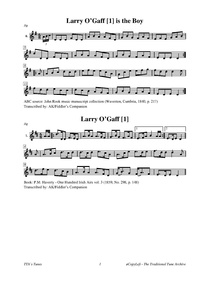Template:Pagina principale/Vetrina: Difference between revisions
No edit summary |
No edit summary |
||
| Line 1: | Line 1: | ||
{{SheetMusic | {{SheetMusic | ||
|f_track= | |f_track=Larry O'Gaffs.mp3 | ||
|f_pdf= | |f_pdf=Larry O'Gaff.pdf | ||
|f_artwork= | |f_artwork=Samuel_lover.jpg | ||
|f_tune_name= | |f_tune_name=Larry O'Gaff | ||
|f_track_title= | |f_track_title=Larry_O' Gaff_(1) | ||
|f_section=abc | |f_section=abc | ||
|f_played_by=[https:// | |f_played_by=[https://soundcloud.com/trad-tune-collection Fionnlagh Ballantine] | ||
|f_notes= | |f_notes=Samuel Lover (24 February 1797 – 6 July 1868), also known as "Ben Trovato" | ||
|f_caption= | |f_caption=Larry O'Gaff was a brave boy for marching, {{break}} | ||
His instep was larege--but his income was small;{{break}} | |||
So he set up, one day, as a soldier of fortune--{{break}} | |||
The meaning of which is--no fortune at all.{{break}} | |||
|f_source=[https:// | |f_source=[https://soundcloud.com/trad-tune-collection/jig-larry-ogaffs-jig Soundcloud] | ||
|f_pix=420 | |f_pix=420 | ||
|f_picpix=200 | |f_picpix=200 | ||
|f_article=[[ | |f_article=[[Larry_O' Gaff_(1) | '''Larry O'Gaff''']] | ||
''' | The "Larry O'Gaff" title for the tune comes from a nonsensical stage-Irish song whose words are only rarely reported (they can be found in a folk version in Creighton's '''Songs and Ballads from Nova Scotia'''), and it appears the melody normally was used as an instrumental piece. The tune/song is firmly ensconced in the late minstrel/early vaudeville stage. | ||
The | It is usually associated with Northeastern players in the United States. The older title was probably "[[Hob or Nob]]" posits Bayard (1981), which was the title of an old British dance. | ||
However, as far back as 1840 it was entered into the music manuscript book of Cumbrian musician John Rook as "Larry O'Gaff is the boy" a title that seems associated with Samuel Lover's (1797–1868) comic piece called "Larry O'Gaff", which begins: | |||
<blockquote> | <blockquote> | ||
'' | ''Larry O'Gaff was a brave boy for marching,''<Br> | ||
''His instep was larege--but his income was small;''<Br> | |||
''So he set up, one day, as a soldier of fortune--''<Br> | |||
''The meaning of which is--no fortune at all.''<Br> | |||
''In battles, bombardments and sieges he grew up,''<Br> | |||
''Till he didn't much care if towns flourish'd or blew up,''<Br> | |||
''And his maxims in life--for he pick'd one or two up--''<Br> | |||
''Were short, sweet and simple for Larry O'Gaff.''<Br> | |||
</blockquote> | </blockquote> | ||
Bronner (1987) suggests a connection with "[[Campbells are Coming (1) (The)]]" and "[[Miss McLeod's Reel (1)]]," which his source (central N.Y. fiddler Les Weir) also called "[[Hob or Nob|Hob or Knob]]". | |||
The | |||
}} | }} | ||
Revision as of 14:40, 19 April 2024

His instep was larege--but his income was small;
So he set up, one day, as a soldier of fortune--
The meaning of which is--no fortune at all.
Played by: Fionnlagh Ballantine
Source: Soundcloud
Image: Samuel Lover (24 February 1797 – 6 July 1868), also known as "Ben Trovato"

The "Larry O'Gaff" title for the tune comes from a nonsensical stage-Irish song whose words are only rarely reported (they can be found in a folk version in Creighton's Songs and Ballads from Nova Scotia), and it appears the melody normally was used as an instrumental piece. The tune/song is firmly ensconced in the late minstrel/early vaudeville stage.
It is usually associated with Northeastern players in the United States. The older title was probably "Hob or Nob" posits Bayard (1981), which was the title of an old British dance.
However, as far back as 1840 it was entered into the music manuscript book of Cumbrian musician John Rook as "Larry O'Gaff is the boy" a title that seems associated with Samuel Lover's (1797–1868) comic piece called "Larry O'Gaff", which begins:
Larry O'Gaff was a brave boy for marching,
His instep was larege--but his income was small;
So he set up, one day, as a soldier of fortune--
The meaning of which is--no fortune at all.
In battles, bombardments and sieges he grew up,
Till he didn't much care if towns flourish'd or blew up,
And his maxims in life--for he pick'd one or two up--
Were short, sweet and simple for Larry O'Gaff.
Bronner (1987) suggests a connection with "Campbells are Coming (1) (The)" and "Miss McLeod's Reel (1)," which his source (central N.Y. fiddler Les Weir) also called "Hob or Knob".
...more at: Larry O'Gaff - full Score(s) and Annotations
